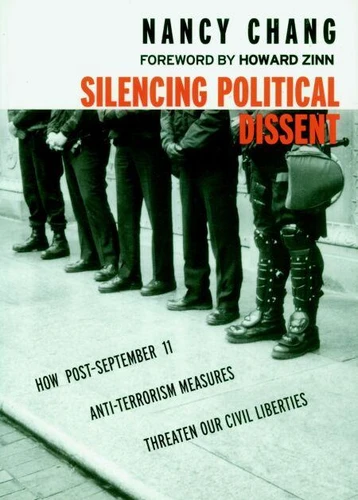Silencing Political Dissent. How Post - September 11 Anti - Terrorism Measures Threaten Our Civil Liberties
Par : ,Formats :
Disponible dans votre compte client Decitre ou Furet du Nord dès validation de votre commande. Le format ePub protégé est :
- Compatible avec une lecture sur My Vivlio (smartphone, tablette, ordinateur)
- Compatible avec une lecture sur liseuses Vivlio
- Pour les liseuses autres que Vivlio, vous devez utiliser le logiciel Adobe Digital Edition. Non compatible avec la lecture sur les liseuses Kindle, Remarkable et Sony
- Non compatible avec un achat hors France métropolitaine
 , qui est-ce ?
, qui est-ce ?Notre partenaire de plateforme de lecture numérique où vous retrouverez l'ensemble de vos ebooks gratuitement
Pour en savoir plus sur nos ebooks, consultez notre aide en ligne ici
- Nombre de pages168
- FormatePub
- ISBN978-1-60980-303-2
- EAN9781609803032
- Date de parution04/01/2011
- Protection num.Adobe DRM
- Taille2 Mo
- Infos supplémentairesepub
- ÉditeurSeven Stories Press
Résumé
In her groundbreaking new book, Silencing Political Dissent, constitutional expert Nancy Chang examines how the Bush administration's fight against terrorism is resulting in a disturbing erosion of First Amendment rights and increase of executive power. Chang's compelling analysis begins with a historical review of political repression and intolerance of dissent in America. From the Sedition Act of 1798, through the Smith Act of the 1940s and the internment of Japanese Americans in World War II, to the FBI's infamous COINTELPRO program of the 1960s, Chang recalls how during times of crisis and war, the U.
S. government has unjustly detained individuals, invaded personal privacy, and hampered the free speech of Americans. Chang's expertise as a senior constitutional attorney shines through in the power and clarity of her argument. Meticulously researched and footnoted, Chang's book forces us to challenge the government when it is unpopular to do so, and to consider that perhaps "our future safety lies in the expansion, rather the contraction, of the democratic values set forth in the Constitution."
S. government has unjustly detained individuals, invaded personal privacy, and hampered the free speech of Americans. Chang's expertise as a senior constitutional attorney shines through in the power and clarity of her argument. Meticulously researched and footnoted, Chang's book forces us to challenge the government when it is unpopular to do so, and to consider that perhaps "our future safety lies in the expansion, rather the contraction, of the democratic values set forth in the Constitution."
In her groundbreaking new book, Silencing Political Dissent, constitutional expert Nancy Chang examines how the Bush administration's fight against terrorism is resulting in a disturbing erosion of First Amendment rights and increase of executive power. Chang's compelling analysis begins with a historical review of political repression and intolerance of dissent in America. From the Sedition Act of 1798, through the Smith Act of the 1940s and the internment of Japanese Americans in World War II, to the FBI's infamous COINTELPRO program of the 1960s, Chang recalls how during times of crisis and war, the U.
S. government has unjustly detained individuals, invaded personal privacy, and hampered the free speech of Americans. Chang's expertise as a senior constitutional attorney shines through in the power and clarity of her argument. Meticulously researched and footnoted, Chang's book forces us to challenge the government when it is unpopular to do so, and to consider that perhaps "our future safety lies in the expansion, rather the contraction, of the democratic values set forth in the Constitution."
S. government has unjustly detained individuals, invaded personal privacy, and hampered the free speech of Americans. Chang's expertise as a senior constitutional attorney shines through in the power and clarity of her argument. Meticulously researched and footnoted, Chang's book forces us to challenge the government when it is unpopular to do so, and to consider that perhaps "our future safety lies in the expansion, rather the contraction, of the democratic values set forth in the Constitution."



